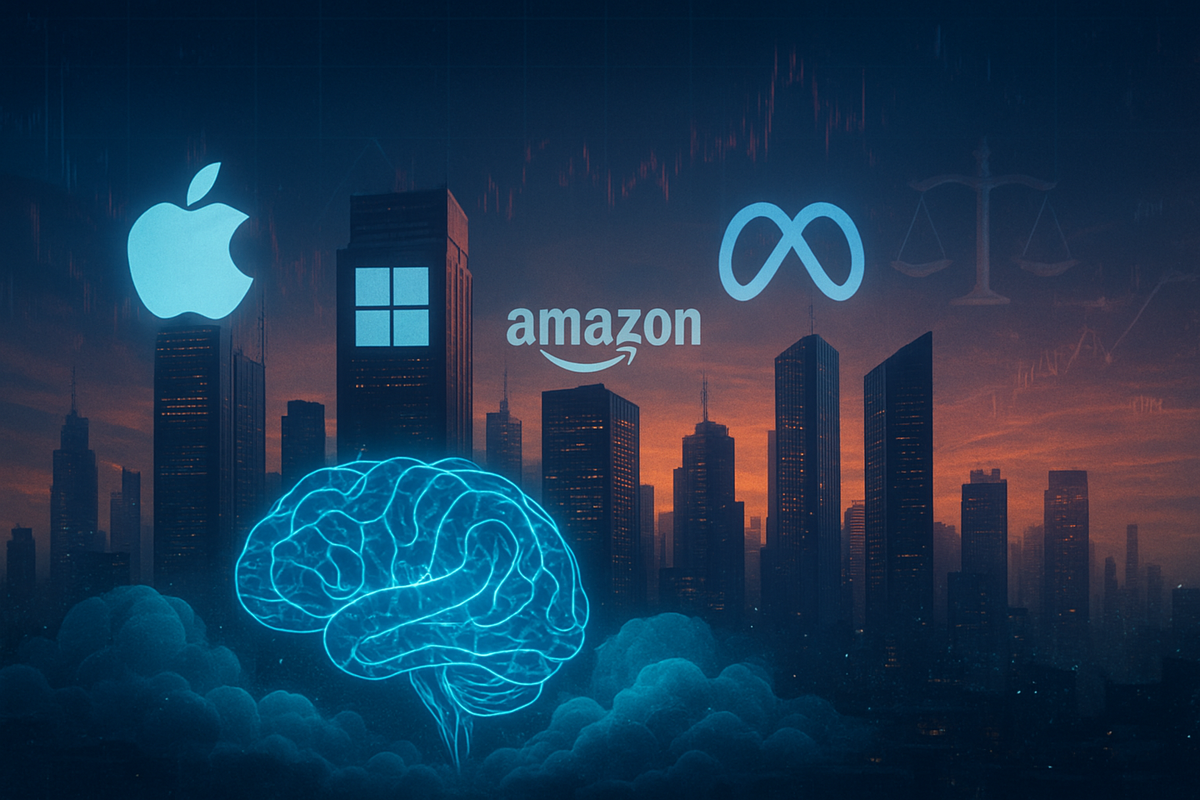Beyond the Duopoly: A Deep Dive into the Shifting Fortunes of Major Tech Giants

As the financial markets approach the close of 2025, the tech sector continues to be a focal point for investors and analysts alike. While much attention often gravitates towards powerhouses like Nvidia (NASDAQ: NVDA) and Alphabet (NASDAQ: GOOGL), a broader examination reveals a complex tapestry of movements, innovations, and regulatory challenges shaping the valuations of other significant players. From Apple's resilient ecosystem to Tesla's ambitious automotive future, and the cloud and AI battlegrounds dominated by Microsoft and Amazon, the landscape is anything but static. This article delves into the recent trajectories of these tech titans, exploring the forces that are driving their performance and setting the stage for their future.
The period leading up to November 25, 2025, has seen these companies navigate a dynamic environment marked by robust earnings, groundbreaking product launches, and an ever-intensifying wave of regulatory scrutiny. Artificial intelligence (AI) and the relentless expansion of cloud computing have emerged as pivotal themes, fundamentally influencing valuations and strategic directions across the board. Investors are keenly watching how these giants adapt to evolving market demands, technological advancements, and a global push for increased accountability and fair competition.
Tech Titans Under the Microscope: A Year of Innovation and Scrutiny
The past year has been a whirlwind for the tech industry, with several major players experiencing significant developments that have shaped their market standing. Apple (NASDAQ: AAPL) has continued to demonstrate remarkable financial health, with its stock performance in 2024 and 2025 largely bolstered by consistent strong earnings in its iPhone and Services segments. The company reported record-setting revenues, with fiscal Q4 2025 (ended September 27, 2025) seeing quarterly revenue of $102.5 billion, an 8% increase year-over-year, and diluted EPS of $1.85, up 13%. Services revenue, in particular, has been a consistent growth driver. On the product front, Apple launched the Vision Pro and visionOS in February 2024, followed by new MacBook Air and iPad models. September 2024 brought the iPhone 16 series, and 2025 saw the release of the M4 MacBook Air, 11th-gen iPad, and the iPhone 17 series, alongside anticipation for an M5 Vision Pro and AirTag 2. However, Apple has faced significant regulatory headwinds, including delaying key AI features in the EU due to the Digital Markets Act (DMA), an ongoing U.S. Department of Justice antitrust lawsuit, and an EPA settlement over hazardous waste violations.
Microsoft (NASDAQ: MSFT) has showcased strong performance, primarily propelled by its commanding position in cloud computing through Azure and aggressive advancements in artificial intelligence. The company's Intelligent Cloud segment has been a primary growth engine, with fiscal Q4 2025 seeing overall revenue up 18% to $76.44 billion, and Intelligent Cloud revenue growing 26%, with Azure surpassing $75 billion in revenue, up 34%. Microsoft's substantial $80 billion capital expenditure plan for fiscal 2025 underscores its commitment to scaling AI and cloud infrastructure, with AI revenue projected to exceed $50 billion by fiscal 2027. The integration and adoption of AI-powered Copilot across its productivity suite are also significant. While not facing specific major regulatory actions beyond being classified as a "gatekeeper" under the EU's DMA, this designation signals increased oversight.
Amazon (NASDAQ: AMZN) has also reported robust growth, with consistent revenue increases across its e-commerce and cloud segments. AWS remains a significant profit driver, with sales increasing 19% year-over-year to $107.6 billion in 2024. The company consistently beat EPS and revenue estimates throughout 2024 and 2025, including a Q3 2025 net sales rise of 13% to $180.2 billion. AWS has continued to innovate, launching new infrastructure and AI services, including custom AI silicon and new foundation models. On the device front, new Kindle models were released, and Prime Video expanded its original content and live sports offerings. However, Amazon faced a historic $2.5 billion settlement with the Federal Trade Commission (FTC) in September 2025 for allegedly enrolling consumers in Prime without consent. It has also grappled with the EU's General Product Safety Regulation (GPSR) and intensified scrutiny over data privacy and seller policies.
Meta Platforms (NASDAQ: META) has experienced significant positive momentum in 2024 and 2025, with shares adding nearly 30% of their value in 2025. This growth is largely fueled by strong advertising revenue, driven by AI advancements and increased user engagement across its platforms like Facebook (NASDAQ: META) and Threads. The company consistently reported strong earnings, with Q4 2024 revenue up 21% year-over-year to $48.39 billion. Meta's substantial capital expenditure plans for 2025, ranging from $70 billion to $72 billion, highlight its commitment to infrastructure expansion for AI development. Like Microsoft, Meta has been designated a "gatekeeper" under the EU's DMA, indicating ongoing regulatory scrutiny of its market power and practices, particularly concerning data and advertising.
Finally, Tesla (NASDAQ: TSLA) has seen its stock movements influenced by a blend of product development, production targets, and significant regulatory challenges. The company reported mixed earnings, with Q4 2024 revenue and adjusted profit falling below estimates, and Q3 2025 profits dropping 37% year-over-year due to higher costs and price cuts. Despite this, Tesla expects vehicle sales to return to growth in 2025, with ambitious product launches on the horizon, including a new mass-market EV codenamed "Redwood" by mid-2025, targeting a $25,000 price point, and the "Model Q" priced under $20,000. The autonomous Cybercab was unveiled in October 2024, with regulatory approval for its Robotaxi service secured in Arizona in November 2025. However, Tesla faces significant regulatory hurdles, including the rapid diminishment of regulatory credits due to U.S. policy changes and challenges in gaining approval for Full Self-Driving (FSD) in Europe, with the Dutch regulator publicly denying claims of imminent approval. A looming Delaware Supreme Court ruling on Elon Musk's 2018 compensation package also poses a potential financial impact.
Winners, Losers, and Market Ripple Effects
The recent developments paint a clear picture of potential winners and losers within the tech landscape. Companies deeply entrenched in the AI and cloud computing revolution, such as Microsoft (NASDAQ: MSFT) and Amazon (NASDAQ: AMZN) with its AWS segment, appear poised for continued growth. Microsoft's strategic investments in AI and its robust Azure cloud platform have consistently driven strong financial results, making it a significant beneficiary of the digital transformation trend. Amazon's AWS continues to be a profit powerhouse, providing the critical infrastructure that underpins much of the digital economy and the burgeoning AI industry. Their ability to rapidly innovate and scale these services gives them a strong competitive edge.
Apple (NASDAQ: AAPL), despite facing regulatory challenges, continues to demonstrate the resilience of its ecosystem. Its strong brand loyalty, consistent product demand (especially for iPhones), and growing Services segment insulate it from some of the volatility affecting other players. The company's focus on integrating AI into its user experience, albeit with some regulatory delays, positions it to maintain its premium market status. Meta Platforms (NASDAQ: META) could emerge as a significant winner if its aggressive AI investments continue to drive advertising revenue and user engagement across its vast social media platforms, proving its ability to adapt and thrive beyond the initial metaverse hype.
Conversely, companies facing significant regulatory headwinds or shifting market dynamics could experience more pronounced challenges. Tesla (NASDAQ: TSLA) is navigating a particularly complex period. The anticipated rapid decline in regulatory credit revenue, a historical boost to its profitability, combined with the substantial costs of developing new mass-market EVs and autonomous driving technology, could pressure its margins. Furthermore, the ongoing regulatory battles over its Full Self-Driving (FSD) technology in key markets like Europe, along with the uncertainty surrounding Elon Musk's compensation package, present considerable risks. While its long-term vision for electric vehicles and autonomous robotaxis is ambitious, the immediate future holds significant hurdles that could impact its valuation and market position. Companies heavily reliant on specific revenue streams that are being challenged by regulators, such as Amazon's Prime subscription practices or Apple's app store policies, also face potential financial penalties and mandated business model adjustments.
The Broader Tapestry: Industry Trends and Regulatory Tides
The recent movements among these tech giants are not isolated incidents but rather critical indicators of broader industry trends and an evolving regulatory landscape. The most pervasive trend is the ubiquitous integration of Artificial Intelligence. Every major tech player, from Apple enhancing its user experience with "Apple Intelligence" to Microsoft's AI-powered Copilot and Amazon's advanced AI services in AWS, is pouring billions into AI research and development. This push is not just about new features; it's about fundamentally reshaping product offerings, optimizing operations, and creating new revenue streams, signaling AI as the next frontier for competitive advantage and market dominance.
Another significant trend is the continued primacy of cloud computing. Microsoft Azure and Amazon Web Services (AWS) remain indispensable infrastructures, powering not only their own vast ecosystems but also countless businesses globally. The demand for scalable, secure, and AI-ready cloud solutions is only growing, cementing these companies' positions as critical enablers of the digital economy. The hardware landscape is also evolving, with Apple's Vision Pro hinting at new spatial computing paradigms and Tesla's aggressive push into mass-market EVs and autonomous vehicles challenging traditional automotive manufacturing.
These developments are occurring against a backdrop of escalating global regulatory scrutiny. The European Union's Digital Markets Act (DMA) has emerged as a powerful framework, designating tech giants as "gatekeepers" and imposing stricter rules to foster competition and protect consumers. Apple's delay of AI features in the EU and Meta's "gatekeeper" status underscore the DMA's immediate impact. Similarly, the U.S. Federal Trade Commission (FTC) has shown a more aggressive stance, evidenced by the historic $2.5 billion settlement with Amazon over Prime subscriptions. These regulatory pressures, coupled with ongoing antitrust investigations, signify a global shift towards reining in the power of big tech, potentially leading to significant fines, mandated changes to business models, and restrictions on mergers and acquisitions. Historically, such periods of intense regulatory oversight, reminiscent of the antitrust actions against Standard Oil or AT&T, have reshaped industries and fostered new competitive environments, suggesting a long-term impact on how these companies operate and innovate.
What Comes Next: Navigating the Future Tech Landscape
Looking ahead, the tech sector is poised for continued dynamism, with both short-term adjustments and long-term strategic shifts on the horizon. In the short term, investors should anticipate continued market volatility influenced by upcoming earnings reports, further developments in ongoing regulatory investigations, and the immediate market reception of new product launches. For instance, the next quarterly reports from Apple, Microsoft, Amazon, Meta, and Tesla will be crucial in assessing the immediate impact of their recent strategies and investments. Any new regulatory actions or legal rulings, such as the Delaware Supreme Court's decision on Elon Musk's compensation, could trigger significant market reactions and force immediate strategic pivots. Companies will be closely watched for their responses to regulatory demands, particularly how they adapt their business practices to comply with acts like the EU's DMA without stifling innovation.
In the long term, the overarching theme will be strategic adaptation and diversification. Tech giants will likely intensify their focus on AI, not just as a feature but as a core competency driving all aspects of their business, from product development to operational efficiency. This will necessitate massive capital expenditures in AI infrastructure and talent, as seen with Microsoft and Meta. Companies may also seek to diversify their revenue streams to mitigate risks from regulatory pressures or market saturation in core areas. For example, Apple's continued growth in services and Amazon's expansion of AWS into new verticals are indicative of this trend. The competitive landscape will likely intensify as AI capabilities become more democratized, potentially leading to new partnerships or acquisitions aimed at securing critical technologies or market share.
Market opportunities will emerge in specialized AI applications, sustainable technologies, and new digital platforms that comply with evolving data privacy and competition regulations. Companies that can effectively leverage AI to create genuinely novel and ethical solutions will find significant growth avenues. However, challenges will persist, including navigating complex geopolitical tensions, securing resilient supply chains, and managing public perception around data privacy and algorithmic bias. Potential scenarios range from a period of sustained growth for adaptive innovators, albeit under stricter regulatory frameworks, to a more fragmented tech landscape where smaller, specialized players gain traction in niches left open by heavily regulated giants. The ability of these tech titans to innovate responsibly while engaging constructively with regulators will largely determine their trajectory in the coming years.
Wrapping Up: A Market in Flux
The detailed examination of major tech stocks beyond Nvidia and Alphabet reveals a market in constant flux, characterized by both remarkable innovation and intensifying scrutiny. The key takeaways from the past year underscore the resilience of big tech, their undeniable commitment to Artificial Intelligence as the future growth engine, and the escalating global pressure from regulators seeking to balance innovation with fair competition and consumer protection. Companies like Apple, Microsoft, Amazon, and Meta continue to demonstrate robust financial health and ambitious growth strategies, largely driven by their dominant positions in cloud computing, AI, and digital ecosystems. However, this growth is increasingly moderated by a complex web of legal and regulatory challenges, as evidenced by significant antitrust actions and data privacy mandates. Tesla, while maintaining an ambitious product roadmap, faces unique pressures from changing regulatory credit landscapes and the high-stakes development of autonomous driving.
Moving forward, the market will continue to be shaped by these intertwined forces. Investors should assess companies not just on their technological prowess and financial performance, but also on their ability to navigate this intricate regulatory environment and their commitment to responsible innovation. The successful integration of AI, the expansion of cloud services, and the development of new, compliant products will be paramount.
Final thoughts on significance and lasting impact: The current era marks a pivotal moment for the tech industry, where the sheer scale and influence of these companies are being re-evaluated globally. The outcomes of current regulatory battles and the strategic pivots undertaken by these giants will have a lasting impact on how technology is developed, deployed, and consumed worldwide.
What investors should watch for in coming months: Key indicators will include the outcomes of major antitrust lawsuits, further developments in AI integration across product lines, quarterly earnings reports (especially focusing on cloud growth, AI-related revenues, and capital expenditures), and any new legislative or regulatory proposals. Geopolitical developments and their impact on supply chains and market access will also remain critical factors influencing the valuations and strategic decisions of these tech titans.
This content is intended for informational purposes only and is not financial advice
More News
View More




Recent Quotes
View More
Quotes delayed at least 20 minutes.
By accessing this page, you agree to the Privacy Policy and Terms Of Service.